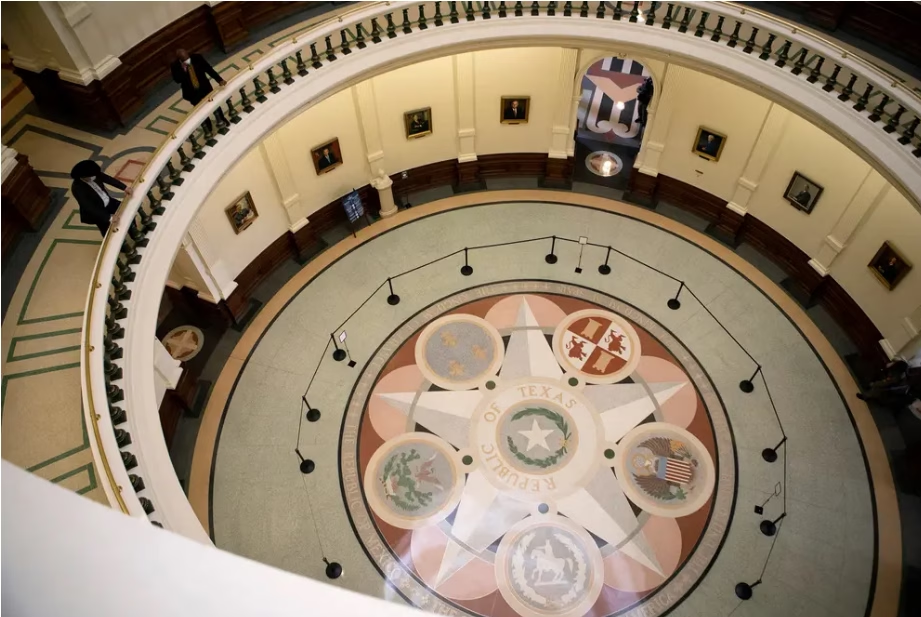By Cassandra Pollock, Jolie McCullough and Shawn Mulcahy, The Texas Tribune
April 26, 2021
“Allegation of sexual misconduct by lobbyist leads to another round of calls for reform in Texas Capitol” was first published by The Texas Tribune, a nonprofit, nonpartisan media organization that informs Texans — and engages with them — about public policy, politics, government and statewide issues.
Sign up for The Brief, our daily newsletter that keeps readers up to speed on the most essential Texas news.
When Speaker Dade Phelan called the Texas House to order Monday, he declared that the Capitol community had been shaken to its core by the allegation that a lobbyist used a date rape drug on a legislative staffer.
“I am disgusted that this sort of predatory behavior is still taking place in and around our Capitol,” Phelan said in a short speech, two days after news of the allegation had come to light.
For many watching though, “still” was the operative word.
Sexual misconduct has long been prevalent at the Capitol, with little oversight of the workplace environment. And on several occasions in recent years, reports of incidents have prompted internal policy changes that were celebrated as a leap forward. But the recent accusation has once again raised questions about whether the current system still allows such behavior.
“There is still a culture of silence and covering things up,” said Rep. Ina Minjarez, D-San Antonio.
On Saturday, the Texas Department of Public Safety confirmed it had opened an investigation into a complaint made recently by a Capitol staffer. Officials have so far declined to comment on further details, including the names of anyone allegedly involved. The news was first reported by the Austin American-Statesman.
The allegation has stirred outrage state lawmakers, staffers and other Capitol observers, with some House members declaring on social media they were banning from their offices any lobbyist or lobby firm associated with the accusation.
By Sunday, HillCo Partners, a prominent Austin-based lobby firm, told state lawmakers in an email that it had launched an internal investigation into the matter. One co-founder of the firm, Bill Miller, later told The Texas Tribune that HillCo had been “tipped off” that one of its employees “is a person of interest” in the investigation.
“If facts come to light that anyone associated with HillCo partners had any involvement with such conduct, that person will be immediately terminated,” HillCo co-founder Buddy Jones wrote, adding that the firm would also cooperate with the DPS investigation.
Later Monday, Austin lawyers David and Perry Minton issued a statement that they were representing “one of the parties that is purportedly being looked into” but did not “plan to identify this client publicly.”
“If, in fact, somebody drugged a capitol staffer, it was not our client nor any employee of HillCo Partners,” the two said. “We can state this with absolute certainty. We respectfully request that everyone involved proceed with due caution before an innocent person’s life is ruined.”
Miller, the HillCo co-founder, told the Tribune later Monday that the lawyers had been hired by the employee — not the firm.
Phelan, who became speaker at the beginning of this year’s legislative session, said during his speech that he was directing the House General Investigating Committee to establish an email hotline for staffers in House offices to submit reports or complaints of harassment in the workplace. The move, he said, was aimed at making it easier for people to report cases of harassment confidentially.
“Victims shouldn’t have to decide between their career and coming forward,” Phelan said. “That has to change.”
The speaker also called for the chamber’s recently implemented sexual harassment prevention training to be completed in-person rather than virtually, saying such a change would be “far more effective.” Phelan said he had directed the House Administration Committee to begin changing the protocol.
“I stand here today having to address these disgusting, detestable allegations that are a symptom of a culture that has been festering in this building for far too long,” Phelan said during his speech. “There is an active investigation underway, and we must let that process play out. However, this sort of behavior has no place in this Capitol, and moving forward, we can and will do better.”
But it was far from the first time in recent legislative sessions that leaders have announced changes designed to prevent sexual misconduct in the Capitol — or punish perpetrators.
In 2017, after The Texas Tribune and The Daily Beast published reports of a pervasive culture of often unchecked sexual harassment and assault, lawmakers scrambled to revise outdated internal policies on reporting and responding to sexual misconduct.
In 2019, the House opted to move investigative duties for complaints of inappropriate behavior to a legislative committee with subpoena power. The chamber also implemented independent investigations of elected officials, who are often the ones accused of harassment and assault by legislative aides, lobbyists and journalists.
The policy shifts were meant to add more teeth to investigations of sexual misconduct and were celebrated by legislators as leaps forward. But many lawmakers and legislative aides took to social media in recent days to decry how little has changed.
“Legislators banning this lobbyist and his firm is not enough,” tweeted Minjarez, the Democratic member of the House, on Sunday. “Change the culture.”
She echoed those concerns in an interview Monday. Lawmakers who have been accused of assault or harassment have suffered little to no consequences in the Capitol building, Minjarez said, sending a bad message to those harmed.
“I’m hearing from staffers that they still don’t feel like they can confidently report, and they don’t feel like they’ll be protected if they do so,” she said.
Two members of the state Senate — Sens. Borris Miles, D-Houston, and Charles Schwertner, R-Georgetown, — have been accused of sexual harassment or assault in recent years. In 2017, the Daily Beast cited stories from unnamed women working at the Capitol who said they were harassed by Miles. No publicly known action was taken against him.
Camille Foster, Miles’ deputy chief of staff, said in a statement Monday that “the alleged allegations made in the 2017 Daily Beast article by unnamed sources are unfounded, unsubstantiated and most importantly untrue.”
Schwertner, meanwhile, gave up his health committee leadership post after the University of Texas at Austin investigated allegations that he sent lewd messages and a sexually explicit photo to a graduate student. Schwertner, who did not cooperate with UT-Austin investigators, at the time repeatedly denied sending the messages. His attorneys told investigators that a “third party” sent them, but would not identify the person. The university ended its investigation in December 2018, concluding that while “available evidence [did] not support a finding” against Schwertner, it did not clear him of any wrongdoing.
This year, Schwertner was once again elevated to a committee chair position. In January, he was tapped to chair the Senate Administration Committee. On Friday, Lt. Gov. Dan Patrick assigned him to chair a new panel, the Senate Special Committee on Constitutional Issues.
Schwertner’s office did not respond to multiple requests for comment Monday.
Patrick said in a statement Monday that the Senate “has a zero-tolerance sexual harassment policy which includes lobbyists, both at the Capitol and off premises.” He said every senator and staffer has received an in-person sexual harassment training and the upper chamber has a “robust protocol for reporting and response to all allegations.”
“We are awaiting the law enforcement investigation of these criminal allegations to determine if there are steps the Texas Senate should take,” Patrick said.
Disclosure: HillCo Partners and the University of Texas at Austin have been financial supporters of The Texas Tribune, a nonprofit, nonpartisan news organization that is funded in part by donations from members, foundations and corporate sponsors. Financial supporters play no role in the Tribune’s journalism. Find a complete list of them here.
This article originally appeared in The Texas Tribune at https://www.texastribune.org/2021/04/26/texas-house-lobbyist-allegation/.
The Texas Tribune is a member-supported, nonpartisan newsroom informing and engaging Texans on state politics and policy. Learn more at texastribune.org.






























